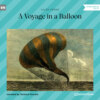Volume 340 pages
About the book
In «Five Weeks in a Balloon,» Jules Verne embarks on a pioneering expedition that blends scientific inquiry with adventure, epitomizing the spirit of the Victorian era's fascination with exploration and innovation. Through the narrative of Dr. Samuel Fergusson and his companions, Verne crafts a detailed, imaginative account of their daring journey across Africa in a hot air balloon. The prose is characterized by vivid descriptiveness and a playful yet meticulous attention to scientific accuracy, reflecting the burgeoning interest in geology, meteorology, and geography during the 19th century. This novel, laden with both thrilling encounters and intellectual curiosity, is a cornerstone of the adventure genre and a precursor to the speculative fiction that Verne would further elaborate in his later works. Jules Verne (1828-1905) is often dubbed the father of science fiction, having laid the groundwork for countless adventures through his innovative storytelling. His early life in Nantes, France, surrounded by maritime culture and a family of legal professionals, likely inspired his imaginative capacities and his penchant for adventure. Verne's extensive research on exploration and technological advancements culminates in this work, illustrating not only the capabilities of humanity but also the period's complex relationship with nature and progress. I highly recommend «Five Weeks in a Balloon» to readers craving a masterful blend of thrilling adventure and thought-provoking inquiry. This novel not only entertains with its exhilarating escapades but also invites contemplation on humanity's relentless quest for knowledge and the moral implications of exploration. As a seminal work, it serves as an essential read for anyone interested in the evolution of science fiction and the spirit of adventure that defines our collective imagination.




















